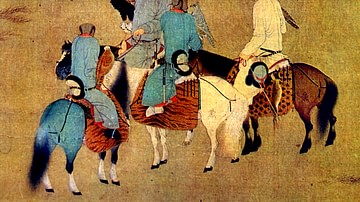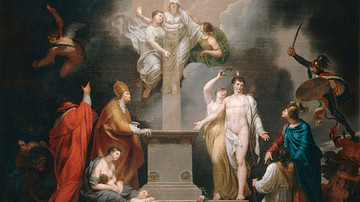Search
Did you mean: Astarte?
Search Results

Article
The Delian League, Part 3: From the Thirty Years Peace to the Start of the Ten Years War (445/4–431/0 BCE)
This text is part of an article series on the Delian League. The third phase of the Delian League begins with the Thirty Years Peace between Athens and Sparta and ends with the start of the Ten Years War (445/4 – 431/0 BCE). The First Peloponnesian...

Definition
Thessaly and the Duchy of Neopatras
Thessaly was an independent state in medieval Greece from 1267 or 1268 to 1394 CE, first as the Greek-ruled Thessaly and later as the Catalan and Latin-ruled Duchy of Neopatras. Under its sebastokrators, Thessaly was a thorn in the side of...

Definition
Khitan
The Khitan people formed the Liao dynasty and ruled parts of Mongolia, Manchuria, and northern China from 907 to 1125 CE. Adopting elements of Chinese government and culture, the Khitan were more than a match for their rivals the Song dynasty...

Definition
Indian Princely States
The Indian Princely states (aka Native States or Princely India) were those states in the Indian subcontinent the British did not conquer but which were typically bound by treaty first to the East India Company and then to the British Crown...

Definition
Ögedei Khan
Ogedei Khan (aka Ogodei) ruled the Mongol Empire from 1229 to 1241. He was the third son of Genghis Khan (r. 1206-1227), the empire's founder. Ogedei's accomplishments included creating a new capital at Karakorum, establishing a system of...

Article
Napoleonic Concordat of 1801 & Religious Pluralism
The Napoleonic Concordat of 1801 defined France's relationship with the Catholic Church for over 100 years. The Organic Articles were added in 1802 and provided state recognition of the Reformed and Lutheran confessions alongside the Catholic...

Definition
Mesopotamian Government - Helping and Serving the Gods
Ancient Mesopotamian government was based on the understanding that human beings were created to help and serve the gods. The high priest, king, assembly of elders, governors, and any other officials were recognized as stewards chosen by...

Collection
Daily Life in Ancient Greece
The ancient Greeks kept themselves busy and there were plenty of chores, distractions and entertainments available to keep daily life varied. Shopping in the markets of the agora, performing jury service, watching sporting events or listening...

Collection
Trade & Commerce in Ancient Greece
The ancient Mediterranean was a busy place with trading ships sailing in all directions to connect cities and cultures. The Greeks were so keen on the rewards of trade and commerce that they colonized large parts of the coastal Mediterranean...

Collection
Government & Society in Ancient Greece
In this collection, we examine one of the greatest contributions made by the ancient Greeks to world culture: their systems of government and, above all, the ideas of democracy and mass participation in politics. We also consider the society...